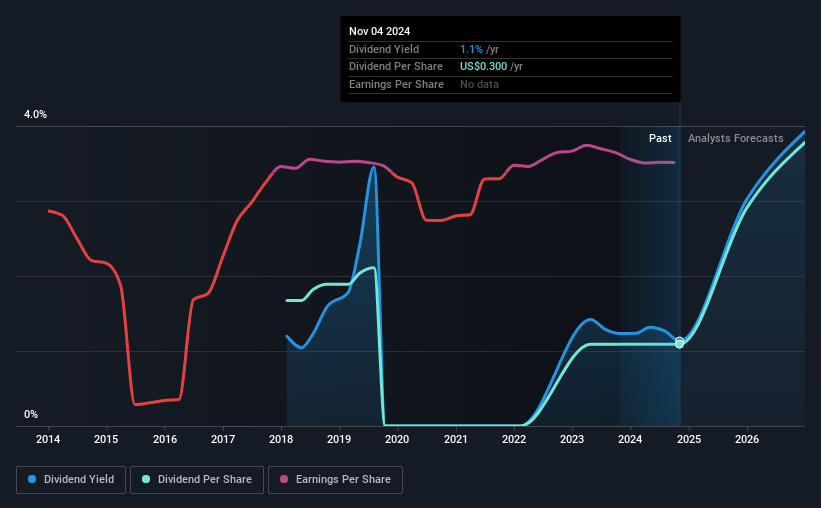
Peabody Energy Corporation (NYSE:BTU) will pay a dividend of $0.075 on the 4th of December. This means the annual payment will be 1.1% of the current stock price, which is lower than the industry average.
See our latest analysis for Peabody Energy
Peabody Energy's Future Dividend Projections Appear Well Covered By Earnings
While yield is important, another factor to consider about a company's dividend is whether the current payout levels are feasible. However, Peabody Energy's earnings easily cover the dividend. This means that most of its earnings are being retained to grow the business.
Looking forward, earnings per share is forecast to fall by 22.6% over the next year. Assuming the dividend continues along recent trends, we believe the payout ratio could be 6.6%, which we are pretty comfortable with and we think is feasible on an earnings basis.

Peabody Energy's Dividend Has Lacked Consistency
Looking back, Peabody Energy's dividend hasn't been particularly consistent. This suggests that the dividend might not be the most reliable. The dividend has gone from an annual total of $0.46 in 2017 to the most recent total annual payment of $0.30. Doing the maths, this is a decline of about 5.9% per year. Declining dividends isn't generally what we look for as they can indicate that the company is running into some challenges.
Peabody Energy Could Grow Its Dividend
Dividends have been going in the wrong direction, so we definitely want to see a different trend in the earnings per share. Peabody Energy has seen EPS rising for the last five years, at 8.0% per annum. Growth in EPS bodes well for the dividend, as does the low payout ratio that the company is currently reporting.
We Really Like Peabody Energy's Dividend
In summary, it is good to see that the dividend is staying consistent, and we don't think there is any reason to suspect this might change over the medium term. The distributions are easily covered by earnings, and there is plenty of cash being generated as well. However, it is worth noting that the earnings are expected to fall over the next year, which may not change the long term outlook, but could affect the dividend payment in the next 12 months. All of these factors considered, we think this has solid potential as a dividend stock.
Investors generally tend to favour companies with a consistent, stable dividend policy as opposed to those operating an irregular one. Still, investors need to consider a host of other factors, apart from dividend payments, when analysing a company. To that end, Peabody Energy has 3 warning signs (and 1 which is a bit concerning) we think you should know about. Is Peabody Energy not quite the opportunity you were looking for? Why not check out our selection of top dividend stocks.
New: Manage All Your Stock Portfolios in One Place
We've created the ultimate portfolio companion for stock investors, and it's free.
• Connect an unlimited number of Portfolios and see your total in one currency
• Be alerted to new Warning Signs or Risks via email or mobile
• Track the Fair Value of your stocks
Have feedback on this article? Concerned about the content? Get in touch with us directly. Alternatively, email editorial-team (at) simplywallst.com.
This article by Simply Wall St is general in nature. We provide commentary based on historical data and analyst forecasts only using an unbiased methodology and our articles are not intended to be financial advice. It does not constitute a recommendation to buy or sell any stock, and does not take account of your objectives, or your financial situation. We aim to bring you long-term focused analysis driven by fundamental data. Note that our analysis may not factor in the latest price-sensitive company announcements or qualitative material. Simply Wall St has no position in any stocks mentioned.
About NYSE:BTU
Very undervalued with flawless balance sheet.
Market Insights
Community Narratives



